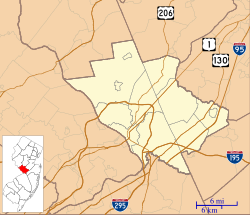 | |
 | |
| Location | Princeton University Princeton, NJ 08542 |
|---|---|
| Capacity | 1,500 (approximate) |
| Construction | |
| Broke ground | 1947 |
| Opened | 1947 |
| Tenants | |
| Princeton Tigers (Volleyball & wrestling) | |
Dillon Gymnasium | |
| Location | Elm Drive, Princeton University, Princeton, NJ |
| Coordinates | 40°20′44.1″N 74°39′31.7″W / 40.345583°N 74.658806°W |
| Built | 1947 |
| Architect | Aymar Embury, class of 1900 |
| Architectural style | Collegiate Gothic |
| Part of | Princeton Historic District (ID75001143[1]) |
| Designated CP | 27 June 1975 |
Dillon Gymnasium is an on-campus multi-purpose athletic facility on the campus of Princeton University in Princeton, New Jersey. It was built in 1947 to replace University Gymnasium, which had burned to the ground in 1944. It houses a 1,500-seat gymnasium, squash courts and a pool.
From 1947 to 1969 it housed the men's basketball team before the building of Jadwin Gymnasium. It currently houses the men's and women's volleyball teams and the wrestling team. It is named for Herbert L. Dillon, class of 1907, a one-time football captain and a principal donor to the building which bears his name.[2]
As the headquarters of Princeton University's Campus Recreation program, Dillon is also home to the 8,000-square-foot (740 m2) Stephens Fitness Center, a 1,280-square-foot (119 m2) Dance Studio, a 1,250-square-foot (116 m2) Martial Arts Room, and a Spinning Room with 14 bikes.[3]
On 15 February 1964 Bill Bradley scored 51 points here in a basketball game for Princeton University, allowing Princeton to defeat Harvard University, 87-56, before 2,700 fans.[4]
- ^ "Princeton Historic District". National Register of Historic Places. National Park Service.
- ^ Leitch, Alexander (1978). A Princeton Companion. Princeton University Press. p. 137.
- ^ "Dillon Gym" (PDF). Campus Recreation. Princeton University. Archived from the original (PDF) on 2016-04-13. Retrieved 2016-03-31.
- ^ "Bradley Scores 51 as Princeton Wins". The New York Times. 16 February 1964.
